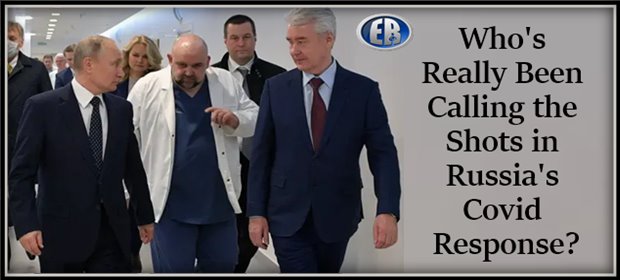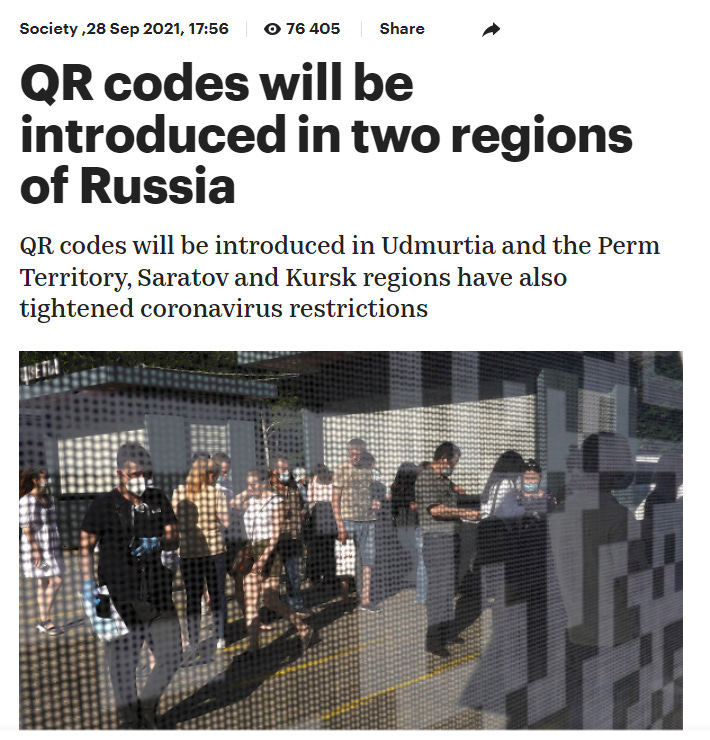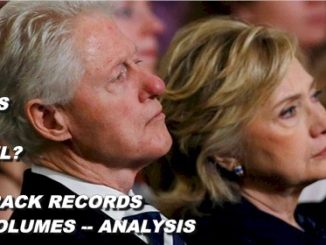
Putin & COVID: Who’s in charge?
To what extent is Putin responsible for Russia’s COVID response?
EDWARD SLAVSQUAT
Putin & COVID: Part IV
We have explored Putin’s role in Sputnik V’s development and deployment, his rather ambiguous position on compulsory vaccination, and his views on the WHO, Big Pharma, and “international cooperation” on COVID.
But is Putin even calling the shots? Pun.
As we pointed out in Part I of this series, Russia’s president is the head of a large, labyrinthine governmental apparatus. He’s one guy; he can’t possibly be making all the final decisions, on all issues, all the time. He has a Cabinet of Ministers for a reason—to delegate responsibilities. Of course, he has the power and authority to guide policy—and intervene when he thinks things have gone awry—but like any manager, he will typically defer to the expertise of his lieutenants and advisers.
And what about the regions? Are they able to act independently of the federal government?
These are all valid and important nuances to consider when determining Putin’s role in Russia’s COVID response.
This article will explore who is in charge of formulating and enforcing “public health” measures in Russia, and to what extent Putin has been involved in this process.
The Operational Headquarters
The “operational headquarters for the prevention of the importation and spread of a new coronavirus infection in the territory of the Russian Federation” (often referred to as “the operational headquarters”) is the federal body in charge of monitoring and directing COVID policies in Russia.
Its members include several officials that make regular appearances on this blog.
Deputy Prime Minister Tatyana Golikova (“Madame Arbidol”) is the chairman of the headquarters. Anna Popova, head of the Federal Service for Supervision of Consumer Rights Protection and Human Welfare (Rospotrebnadzor), serves as co-chair. Health Minister Mikhail Murashko—a member of the WHO Executive Board—is included on the operational headquarters’ roster of senior officials. Putin is not a member.

There are also “operational headquarters” at the regional level. These local committees work in tandem with regional health ministries and regional departments of Rospotrebnadzor. These regional authorities have been granted powers to draft and enforce Virus-related decrees, but they are guided by “recommendations” (and in many cases, directives) issued by the federal government, which has strict criteria for determining whether a region is “COVID-free.”

There is certainly an argument to make that some regions have shown more enthusiasm for achieving “COVID-free” status than others, but there is not a single documented case—we’ve searched and searched, in vain—of a region openly defying the federal government’s dictates.
Inconsistencies in enforcement can be attributed to two factors: regional authorities who are unable, or unmotivated, to ensure strict compliance, and the defiant resistance to COVID measures among the general population.
The federal government is free to issue directives willy-nilly, but the regions are forced to walk a tightrope. They’re tasked with trying to appease the center without sparking open rebellion against these deeply unpopular measures.
Aware of this balancing act, the federal government has created incentives to encourage regions to seek “COVID-free” status.
In October 2021, Prime Minister Mikhail Mishustin signed an order providing grants—totaling 5 billion rubles—to regions that aggressively enforced federal COVID directives.

As the State Duma’s website explained, increasing vaccination rates was one of the conditions that needed to be met to qualify as “COVID-free”:
Applicants for the title of a territory free from COVID-19 must meet a number of criteria that are being developed by Rospotrebnadzor. Among them are the incidence rate of COVID-19, the coverage of residents of the region with PCR testing, the number of people vaccinated with the first component of the vaccine.
The federal government may be leading the response to COVID, but this doesn’t necessarily mean Putin has any meaningful role in formulating these policies.
So is it fair to hold Putin personally responsible for COVID measures?
As we stressed in Part I of this series, we can’t offer definitive answers. But let’s examine the available evidence—in chronological order.
April 2021
Regional governments need to do a better job of prioritizing vaccination, Putin told the Federal Assembly on April 21, 2021:
The heads of the regions should deal with vaccination issues on a daily basis, all Russian citizens should have the opportunity to be vaccinated so that collective immunity to coronavirus is formed in autumn, Russian President Vladimir Putin said.
“Vaccination is of central importance now. I ask the government, the Ministry of Health, the heads of regions to deal with these issues on a daily basis,” he said.
May 2021
While attending a meeting on the “sanitary and epidemiological situation” in Russia, Putin reminded regional governments of the need for a roadmap for lifting COVID restrictions, adding it was important to include Rospotrebnadzor and the State Council (and advisory body to the president) in the decision-making process.
“As we agreed, such plans should take into account the real situation on the ground, ensure strict security requirements, protection of life and health of people, based on a verified assessment of the level and degree of possible threats,” Putin said on May 11.

Putin also encouraged regional authorities to take all necessary measures to enforce “public health” guidelines.
“The leaders of the regions, taking into account the situation on the ground, with the recommendation of sanitary doctors, retain the right, in agreement with the government of the Russian Federation, to restrict or even temporarily suspend the activities of enterprises in the event that sanitary safety measures cannot objectively be provided there,” the Russian president said.
June 2021
The introduction of compulsory vaccination policies in Moscow and several other regions in June 2021 prompted Tatyana Moskalkova, Russia’s Ombudsman for Human Rights, to criticize these measures as unethical.
Kremlin Spokesman Dmitry Peskov was dismissive of Moskalkova’s concerns, claiming “the situation required vigorous measures”:
[Peskov] added that unvaccinated Russians without antibodies would somehow find themselves at a disadvantage: “Discrimination will inevitably come,” Putin’s spokesman said.

July 2021
At a meeting with members of his government on July 21, 2021, Putin emphasized the need for mass immunization, and reminded regional leaders of the tools they had to increase vaccination rates in their territories:
[Putin] recalled the right of the regions to introduce mandatory vaccination of certain categories of citizens in the event of a sharp increase in the incidence, but at the same time ordered them to respect rights of those who, for health reasons, cannot be vaccinated.
The president also ordered the heads of regions to “personally and steadfastly” deal with vaccination issues and demanded that problems with the delivery and distribution of the necessary drugs be immediately resolved.
August 2021
By August 2021, more than a dozen regions had introduced mandatory vaccination policies. Putin was pleased with “rapid pace” of immunization taking place in “some regions,” and asked Health Minsiter Murashko to identify the “best [vaccination] practices” and implement them in all regions.

TASS reported on August 5, 2021:
“In some regions, vaccination is proceeding at a fairly rapid pace, in others it is slower, it is necessary to take the best practices and implement them throughout the entire Russian Federation, in all regions,” Putin said at a meeting with members of the government.
In turn, Russian Health Minister Mikhail Murashko said that the Ministry of Health discussed methods for transferring successful vaccination methods to other subjects.
“Suggest them to colleagues in other regions. If necessary, then hold a corresponding meeting—you can think about allocating additional resources for this, it’s all possible,” Putin stressed.
On August 9, Putin instructed the Cabinet of Ministers and regional authorities to coordinate all decisions in the event of the need for new coronavirus restrictions:
“The Government, together with the executive authorities of the constituent entities, should ensure coordination of the actions of the federal executive authorities and the executive authorities of the constituent entities of the Russian Federation in the event that decisions are made at the regional level to introduce additional restrictive measures in the face of a worsening situation as a result of the spread of a new coronavirus infection (COVID-19),” says the order, published on Monday on the Kremlin website. […]
In addition, Putin instructed federal officials and governors to organize daily monitoring of the delivery of vaccines from manufacturers to vaccination centers.
He also recommended regional governors “take personal control over the implementation of measures to vaccinate the population.”
September 2021
Although some regions had recently adopted compulsory vaccination decrees, by September 2021, COVID restrictions were relatively lax in Russia—especially when compared to other parts of the world.
This all changed after State Duma elections in late September. Speaking a day before the election results were announced, Annette Kyobe, IMF Representative in Russia, made a prophetic observation. As TASS reported on September 23:
“There is no appetite [in Russia] for restrictive measures, lockdown, at least on the part of state authorities … After the parliamentary elections, perhaps a more unpopular measure, like mandatory vaccination, can be initiated as early as October-November,” Kyobe said.
As it just so happens, COVID “cases” and “deaths” inexplicably began to skyrocket immediately after United Russia secured its majority in parliament until 2026.

Forced to take drastic measures to protect public health, Russia’s regions—in close collaboration with the federal government, as ordered by Putin—began adopting mandatory vaccination decrees and QR code systems.

Impressive foresight from the IMF lady. (Could this amazing crystal ball-reading have anything to do with Russia’s Deputy Finance Minister, Timur Maksimov, proclaiming at an IMF summit held a month later that “the world will not return to the old normal until all countries are vaccinated in the required proportion”? It’s a mystery!)
October 2021
On October 25, 2021, Putin ordered the Cabinet of Ministers to ensure an increase in the rate of vaccination in the regions. Immunization efforts should “include those previously vaccinated, as well as those who have been ill with this disease, paying special attention to people over the age of 60 and people suffering from chronic diseases,” the Russian president instructed.
He also recommended that the heads of regions introduce self-isolation for citizens over 60 who had not yet been vaccinated.
A day later, on October 26, TASS reported that every federal subject had implemented some form of compulsory vaccination.
November 2021
By November 1, every region had adopted a digital health pass system.
Apparently Putin still didn’t think enough was being done to ensure every Russian adult got a vaccine.
RIA Novosti reported on November 24, 2021:
Russian President Vladimir Putin appealed to the heads of regions with a request to treat the issues of vaccination against coronavirus responsibly.
“I also count on the heads of the regions of the Russian Federation… [to take] greater responsibility for the timeliness in making decisions on vaccination against coronavirus. I very much count on the performance of your duties in this regard,” Putin said at a meeting with members of the government.

On November 29, Putin signed a law extending until the end of 2022 certain budgetary powers for the regions, including the authority to make decisions “in connection with the persistence of the difficult epidemiological situation.”
December 2021
On December 5, 2021—at a time when every region in Russia had mandatory vaccination decrees and QR code regimes—Putin said that his government was doing everything it could to avoid using coercive methods on the population:
“Indeed, the most important task here is to vaccinate the population,” he said, speaking about the situation with the pandemic. “And we are trying not to follow the path of coercion, but rather the path of persuasion.”
The Russian authorities, Putin continued, are trying to combat the prejudice associated with the rejection of vaccination.
“And I must say that in general—especially in recent times—we see that this brings the desired result,” the head of state shared.

Part V will explore “Putin & COVID” post-February 24.
Edward Slavsquat is trying follow the path of persuasion to get you to subscribe
************
Source

••••
The Liberty Beacon Project is now expanding at a near exponential rate, and for this we are grateful and excited! But we must also be practical. For 7 years we have not asked for any donations, and have built this project with our own funds as we grew. We are now experiencing ever increasing growing pains due to the large number of websites and projects we represent. So we have just installed donation buttons on our websites and ask that you consider this when you visit them. Nothing is too small. We thank you for all your support and your considerations … (TLB)
••••
Comment Policy: As a privately owned web site, we reserve the right to remove comments that contain spam, advertising, vulgarity, threats of violence, racism, or personal/abusive attacks on other users. This also applies to trolling, the use of more than one alias, or just intentional mischief. Enforcement of this policy is at the discretion of this websites administrators. Repeat offenders may be blocked or permanently banned without prior warning.
••••
Disclaimer: TLB websites contain copyrighted material the use of which has not always been specifically authorized by the copyright owner. We are making such material available to our readers under the provisions of “fair use” in an effort to advance a better understanding of political, health, economic and social issues. The material on this site is distributed without profit to those who have expressed a prior interest in receiving it for research and educational purposes. If you wish to use copyrighted material for purposes other than “fair use” you must request permission from the copyright owner.
••••
Disclaimer: The information and opinions shared are for informational purposes only including, but not limited to, text, graphics, images and other material are not intended as medical advice or instruction. Nothing mentioned is intended to be a substitute for professional medical advice, diagnosis or treatment.




